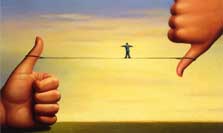Part 3: What is Morality?
One question we have not asked is: What is morality? Since morality informs law to some extent and since a crime is a violation of law, we should say something about morality. Morality has to do with right and wrong. For our purposes the terms moral , right , and ethical are all equivalent. Conversely, the terms immoral , wrong , and unethical are equivalent. Beyond this it is difficult to define morality due to the diversity of moral theories. The only commonality between all moral theories is that they attempt to answer at least one of the following questions:
- What is the right thing to do?
- What is the right sort of person to be?
When we talk of morality we are talking about what is right and what is wrong in regards to either an action or a character trait. Though we speak of things as either right or wrong, there are actually three different answers. For example, suppose Alf is driving down the road when he sees Betty injured and bleeding on the side of the road. Alf considers three possible actions.
- First, he could ignore Betty and drive past.
- Second, he could stop, call 911 on his cell phone, and wait for help.
- Third, he could stop, use his shirt to lessen Betty's bleeding, put her in his car, and drive her to the hospital (as that would be quicker than waiting for an ambulance, but it would mean getting blood stains in his car).
We might analyze Alf's options morally as follows: First, to drive by leaving Betty to bleed to death when he could at least call for an ambulance is immoral . Second, to stop and call for an ambulance is satisfactory (it may not be the best action Alf could take but it certainly passes as the moral minimum). Third, to stop and put himself out to help Betty at the cost of his shirt, time, and damage to his leather interior might be “ supererogatory ” (above and beyond the call of duty). We might display the range of actions Alf might take as follows:

As we can see, we can categorize actions and character traits as being in one of three categories. Part of the controversy in morality is where to draw the boundaries between immorality, the moral minimum, and supererogatory actions and character traits. For example, there are those who think that meeting the minimum conditions of morality requires an awful lot. Such persons might depict Alf's dilemma as follows:

On this sort of interpretation the moral minimum requires much more of Alf. Although it might place “calling for an ambulance” in the immoral category along with “leaving Betty to die,” this only means that neither option is a moral solution. It might still be that calling for help is “better” than leaving Betty to die, but neither is a morally acceptable on this view. To have a supererogatory act requires much more on this view (paying her bills in addition) than on the previous view. We could also adopt a moral view that requires less of the moral minimum such that even calling for an ambulance is a supererogatory action. A good part of determining what ought to be a crime will revolve around figuring out what the moral minimum requires because once we know what the moral minimum is, then we can ascertain what sorts of immorality ought to be criminalized.
Attempts to explain the boundaries between immorality, the moral minimum, and supererogation are known as moral theories . A moral theory will attempt to explain how we know what is moral and immoral. What we will find is that our view of morality will inform our view of the law, which will in turn tell us what a crime is (and isn't). As this is not a course in moral theory, we will not focus on these questions except for three brief depictions of moral views, which are often used to inform the law through the political process.
Utilitarianism
Utilitarianism begins with Jeremy Bentham and continues through modern day thinkers. However, arguably the most influential utilitarian thinker was John Stuart Mill (whose writings will be of special significance in this course beyond utilitarianism). Utilitarianism is a moral theory which has had a huge influence on the law and therefore on crime. We can boil down utilitarianism's moral code as follows: To determine right from wrong obey these principles:
- What makes an action right or wrong are the consequences of the action.
- The only consequence that matters is happiness .
- No person's happiness counts more than anyone else's.
In other words, utilitarians claim that whatever action brings about the most happiness for everyone involved is the right one. Utilitarian arguments are quite common, though they may not call themselves utilitarian. Often utilitarians will defend their views with phrases like: We must do X for the greater good or We must do what brings about the greatest happiness for the greatest number or The end justifies the means.
 Utilitarianism only demands that we do what brings about the greatest happiness for all affected; beyond this no action is intrinsically right or wrong. As a result the law must be flexible enough to handle a variety of cases and determine how to maximize the greatest happiness overall. A utilitarian will admit that as a rule of thumb , lying, stealing, and killing are not conducive in achieving the greatest happiness for all involved; but there may be cases where lying, stealing, or killing are the correct solution and the laws should reflect this.
Utilitarianism only demands that we do what brings about the greatest happiness for all affected; beyond this no action is intrinsically right or wrong. As a result the law must be flexible enough to handle a variety of cases and determine how to maximize the greatest happiness overall. A utilitarian will admit that as a rule of thumb , lying, stealing, and killing are not conducive in achieving the greatest happiness for all involved; but there may be cases where lying, stealing, or killing are the correct solution and the laws should reflect this.
Concerning crime and the law, the utilitarian holds that laws should achieve the greatest happiness for the greatest number of citizens. If criminalizing a behavior will yield the greater happiness, then it should be criminalized. If criminalizing a behavior just leads to less happiness, then it should not be criminalized. Given this, a utilitarian may or may not wish to criminalize a vice depending upon the consequences of criminalization. As we shall see, this allows that some vices might be crimes where others are not. For instance, a utilitarian might have supported alcohol prohibition due to the negative consequences caused by alcohol (domestic violence, accidents, etc.), but the same utilitarian could latter oppose prohibition on the grounds that the negative consequences caused by criminalizing alcohol (speakeasies, Al Capone's booze crime wave, etc.) was even worse than allowing the vice to continue legally.
Aristotle: Nicomachean Ethics
For Aristotle, morality is not a matter of action but of character. Being a moral person means developing virtues. Immorality is demonstrated by vices (character flaws). Virtues are those qualities that are in accord with living a life of reason. Virtues are rarely intrinsic ; they are learned and developed through practice. As a result, Aristotle says virtues can be taught. Society can train people to be virtuous if they are brought up correctly. This view is common even today as a great many people think that schools and government need to do more to encourage “virtues.” (Two examples of this are: President Bush's plans to fund “character education” in schools and Hillary Clinton's book, It takes a Village to raise a Child . Both imply that society can and ought to teach virtues).
The opposite of a virtue is a vice. For Aristotle, virtues tend to be the “mean” or balance between the extremes of excess and deficiency. Aristotle believed that reason required a life of moderation. Too much, or not enough of something is often a vice , whereas the right amount is a virtue. It is clear how not enough honesty or bravery is a vice (dishonesty and cowardice), but Aristotle also indicates that too much honest or bravery is a vice. Imagine living with someone who was 100% honest about everything they thought. They tell you whenever you are being stupid or whenever your outfit makes you look fat, etc. Do you view their 100% honesty as a virtue or a vice? Being physically fit is a virtue, but too much or to little exercise is a vice. Courage is a virtue; too little courage and you're a coward, too much and you're foolhardy (see cartoon below).

Aristotle applied this moral view to law by holding that the purpose of government is to promote virtues in citizens. Virtues can arise in citizens in three ways. First , virtues can arise in nature. Aristotle thinks this is rare, but admits that some people are blessed with a virtuous nature. Second , for those who are not virtuous by nature we can teach them the virtues through education and upbringing. Aristotle thinks that education, proper rearing, and arguments will fail to persuade those “who live as passion directs.” Third , those who are not virtuous by nature and who are not persuaded by arguments or education must be made virtuous by the force of law. Even the person who is full of vice will be motivated by the force of law to act virtuously for fear of punishment. This means that Aristotle is advocating a paternalistic limitation upon our liberty.
What is Paternalism?
Paternalism: Society may restrict our liberty for our own good.
Paternalism can be taken in two ways and in varying degrees. First, paternalism can mean that society can prevent us from doing thing that cause us harm (swimming in a raging river). Second, paternalism can mean that society can require us to do things for our own good (wearing a seatbelt). A restriction on liberty is only paternalistic if it is done strictly for our own good.
 Aristotle would be considered a paternalist of sorts because for Aristotle the role of the state (government) is to create better people (promoting virtue in citizens). A good society promotes virtues whereas a government that does not promote virtues fails to be a good government. Given
Aristotle would be considered a paternalist of sorts because for Aristotle the role of the state (government) is to create better people (promoting virtue in citizens). A good society promotes virtues whereas a government that does not promote virtues fails to be a good government. Given this view of the role of government, it is easy to see how Aristotle would support paternalism. If something is a vice (not good for you, it is the role of the state to encourage you to avoid it. Conversely, if something is virtuous (good for you), it is the role of the state to encourage you to take part in it.
this view of the role of government, it is easy to see how Aristotle would support paternalism. If something is a vice (not good for you, it is the role of the state to encourage you to avoid it. Conversely, if something is virtuous (good for you), it is the role of the state to encourage you to take part in it.
Aristotle recognizes that “one size does not fit all.” In other words, Aristotle does not believe that there is a single path to the virtuous life that works for everyone. Aristotle would say that yes, the law ought to promote virtues, but that the law must not be overbearing and must take into account the relevant differences of the people. For instance, Aristotle points out that a teacher (in his case, a boxing coach) does not teach the same style of fighting to each student because each student has unique talents and needs. What this means for Aristotle's theory of government is that paternalism is justified to promote virtue and discourage vice through criminal law, but government must only do so when it is practical to do so and after considering the diverse needs and talents of the people.
Libertarianism
Who owns you? This question is the starting point for libertarian moral theory. According to libertarians, each rational adult in effect owns themselves. As a result, there is a moral right to liberty that serves to inform the law. The state has no justification to restrict liberty through law for our own good as this is a violation of self-ownership. Broadly speaking, libertarianism is the view that:
- The purpose of the law is to protect the individual rights of citizens (most notably life, liberty, and property).
- Rights are entirely (or almost entirely) negative in nature.
- The use of force (without the consent of those being forced) is only justified to prevent a harm to others.
While many thinkers adopt some of these principles, libertarians accept them all. Libertarianism stands in stark contrast to the paternalism of Aristotle. Where Aristotle thinks the law should promote virtues (sometimes through paternalism), libertarians reject this as a violation of self-ownership. For libertarians, if we want to ruin our own lives by perusing vices instead of virtues, that's our business. Only when we harm someone else can law intervene. It is improper for government to employ paternalism or to criminalize activities simply because they are associated with vice. Regarding libertarians' view on rights, it is necessary to make a distinction between positive and negative rights.
Positive rights : are claims about what society owes the individual.
 They take the form, “I have a right to X because it is owed to me.” Examples of positive rights would be the right to welfare, health care, and the right to vote. Each claims that society owes the individual and thereby must provide something to the individual (food, a free clinic, or a voting booth and ballot).
They take the form, “I have a right to X because it is owed to me.” Examples of positive rights would be the right to welfare, health care, and the right to vote. Each claims that society owes the individual and thereby must provide something to the individual (food, a free clinic, or a voting booth and ballot).
Negative rights : are claims about what society cannot do to the individual.
They take the form, “I have a right to X because it is wrong to interfere with my X-ing.” Examples of negative rights would be the right of life, free speech, and property. Each of these are claims about what society cannot do to, or interfere with (it cannot kill me, it cannot stop me from speaking, and it cannot take or damage my property).
 Often people will argue for one type of right and against the other. It is also useful to make this distinction as we can speak of some rights as either positive or negative, each
Often people will argue for one type of right and against the other. It is also useful to make this distinction as we can speak of some rights as either positive or negative, each  carrying a different meaning. For instance, where a negative right to free speech means that society cannot stop me from speaking, a positive right to free speech means that society owes me an opportunity to speak (perhaps providing me a stage with a megaphone or providing TV time for me to speak my views). A positive right to life might mean that society owes me food, clothing, shelter, and other things necessary for me to live. Whereas a negative right to life means only that you can't kill me. Certain political philosophers will adopt a strictly negative view of rights while others endorse positive rights.
carrying a different meaning. For instance, where a negative right to free speech means that society cannot stop me from speaking, a positive right to free speech means that society owes me an opportunity to speak (perhaps providing me a stage with a megaphone or providing TV time for me to speak my views). A positive right to life might mean that society owes me food, clothing, shelter, and other things necessary for me to live. Whereas a negative right to life means only that you can't kill me. Certain political philosophers will adopt a strictly negative view of rights while others endorse positive rights.
Utilitarianism, Aristotle, and Libertarians have each offered a moral theory which says something different about the topic of vice and crime. We will keep these three theories in mind when we look at the issues of what should constitute a vice and what should constitute a crime. In our next and final section of this module we will take a closer look at the assigned reading as well as our first discussion exercise.
Thought Question: Which Moral Theory is best?
Though this is not a course in moral theory students should consider which, if any, of the moral theories presented here is the best one? Or, if none are sufficient then which would they choose? What do you see as the strengths and weaknesses of each theory? There will be many thought questions like this one in the course. Students are asked only to think about them and, if interested in them, post their response to the “Open Forum.”